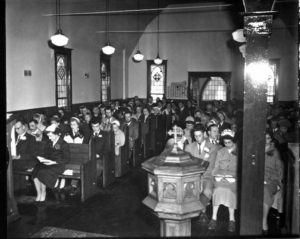American Lutherans and the Problem of Pre-World War II Germany
Concordia Theological Quarterly (Volume 80, Number 3-4, July/October 2016)
John P. Hellwege Jr
309-331
The Lord be with you
In the 1920s and 30s, Americans looked across the Atlantic at what was going on in Europe and struggled to make sense of it all. This not only included the rise of Communism and its ardent persecution of religion, but also the rise of National Socialism (like the Nazi party of Germany). While Communism was brashly anti-religion, National Socialism wasn’t. In fact, it had a neo-pagan religious agenda (though it preached toleration of “positive Christianity”).
 In no segment of the North American population was the struggle to understand developments in Germany greater than in the Lutheran Church. What were the paradigms that should be used to evaluate developments? Should they be religious or secular? What sources of information could be trusted?
In no segment of the North American population was the struggle to understand developments in Germany greater than in the Lutheran Church. What were the paradigms that should be used to evaluate developments? Should they be religious or secular? What sources of information could be trusted?
Like the rest of America, different opinions concerning Hitler were present in North American Lutheranism. (Don’t forget that Time Magazine named Hitler the “Man of the Year” in 1938.) However, by 1940, all the Lutheran Churches in America were opposed to Hitler and the Nazi party, seeing it as a threat to Christianity as great as Communism. This shift came as Lutherans evaluated the Nazis from a theological perspective instead of a secular one.
In his article, “American Lutherans and the Problem of Pre-World War II Germany,” John P. Hellwege Jr gives us a fascinating look at the struggle to understand what was happening in Germany by North American Lutherans. He ends by writing:
More than anything else, when they utilized their theological tools of concern about liberal thought, and unionism, as well as applying the correct limits of the state according to the doctrine of the Two Kingdoms and the need to love one’s neighbor, they ended up coming to the right answers. In fact, it appears that the more the North Americans were mesmerized by purely secular concerns, the more troubled they had in giving a proper analysis of the situation in Germany. But when they leaned more on their theological standards, they were better able to see clearly. (331)
This link (AMERICAN LUTHERANS AND PRE-WORLD WAR II GERMANY) will take you to the article.
John P. Hellwege Jr, is Assistant Professor of Theology at Concordia Lutheran Seminary, Edmonton, Alberta, Canada.
Blessings in Christ
Pastor Rickert
